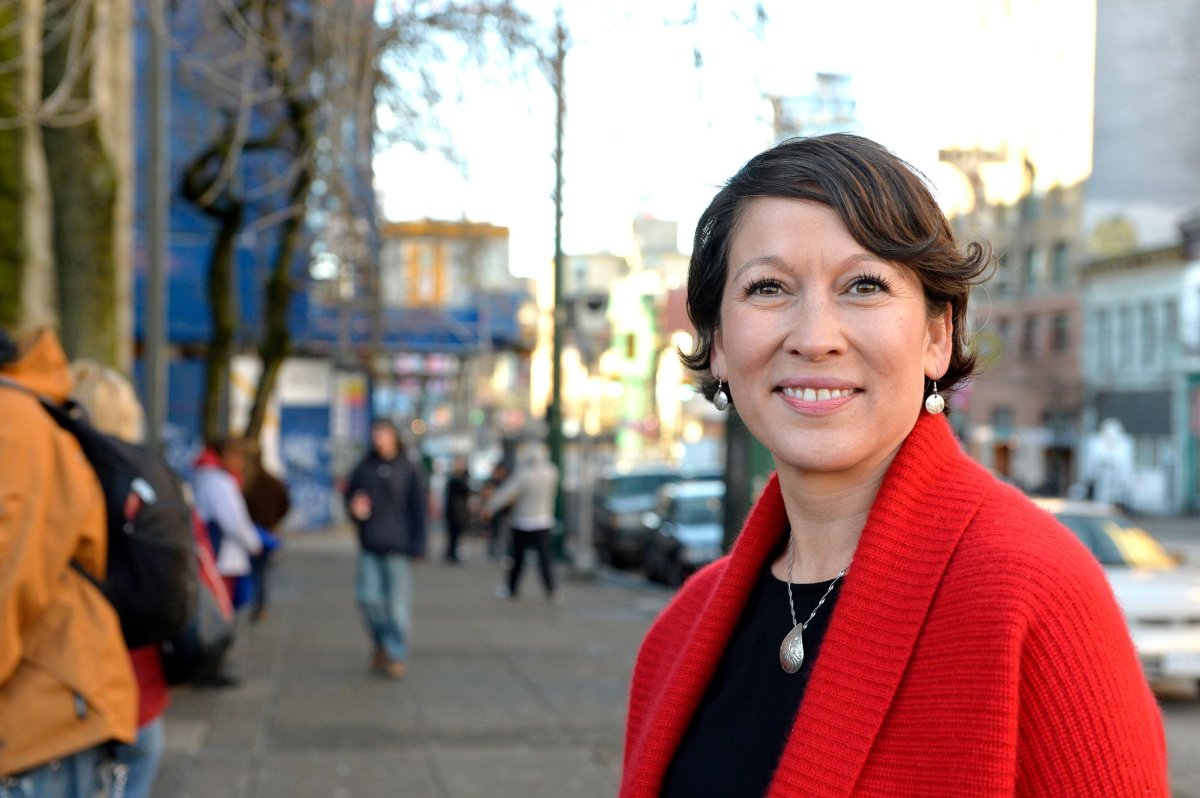The B.C. legislature will resume sitting next week when the Throne Speech is delivered, and newly elected MLA Melanie Mark will be watching from the gallery.

She hasn’t been officially sworn-in as a member of legislature yet, but the fact that Mark will even be in the legislative building carries historical significance for the Nisga’a citizen.
Mark made history this week when she became the first First Nations female to be elected to the B.C. legislature – a win celebrated not just by her constituency, but by First Nations people and supporters all over.
WATCH: NDP candidate Melanie Mark wins Vancouver-Mount Pleasant byelection
“Today is another milestone in the history of the Nisga’a people and for aboriginal women across British Columbia,” said H. Mitchell Stevens, President of Nisga’a Lisims Government, in a statement.
It should come as no surprise to anyone that the relationship between Indigenous peoples and the government has been a strained one.
READ MORE: B.C. appeal court upholds Nisga’a treaty against constitutional challenge
In 1887, the Nisga’a nation was pushing the B.C. government to recognize their right to land title. According to a historical timeline on the Nisga’a Lisims Government website, a group of Nisga’a chiefs traveled by water to meet with the provincial government in legislature. When they arrived, they were “turned away on the steps of legislature by Premier William Smithe.”
- B.C. Conservative leader pledges not to ‘reopen the abortion debate’
- A look inside the now-sidelined ‘floatel’ meant to house LNG workers near Squamish
- Canfor to shutter B.C. sawmill, curtail Prince George pulp mill
- South Surrey restaurant forced to close after suspicious fire, more criminal acts reported
In 1927, the Canadian government had amended the Indian Act that year – making it illegal to raise money and hire legal counsel to advance aboriginal title claims – with the Nisga’a no closer to reaching an agreement.
In B.C., status Indians weren’t allowed to vote provincially until 1949, and across Canada, status Indians weren’t allowed to vote in federal elections until 1960.
It was in 1949 that Frank Calder, a Nisga’a hereditary chief, became the first First Nations person to be elected into the B.C. legislature. But it wouldn’t be until 1968 that Len Marchand, a member of the Okanagan Indian Band, became the first Indigenous member in the House of Commons.
It will be people like Mark who ensure the history books don’t look as bleak another 100 years from now.
“It’s always scary, as you can imagine, to stand up and fight power when you don’t come from privilege,” Mark said at a campaign event. “And people say if you’re a leader you can’t be emotional.”
However, Mark said she can’t wait to fight.
“This isn’t my first rodeo,” said the 40-year old of Nisga’a, Gitxsan, Ojibway and Cree ancestry. She joins Jody Wilson-Raybould, the first Indigenous female Minister of Justice, and Carole James, the first Metis MLA, as prominent Indigenous politicians in B.C.
READ MORE: New justice minister brings unique perspective to First Nations issues
“It’s exciting to see that happen with Indigenous women in B.C. and Manitoba,” says Wab Kinew.
Kinew, an acclaimed Indigenous educator, author and activist, is one of an increasing number of First Nations people to throw his hat into the ring of Canadian politics. This week he announced his candidacy for the Manitoba NDP in this year’s provincial election.
READ MORE: Wab Kinew to run for NDP in Manitoba election
Recalling his father’s involvement in politics, Kinew said his father and other Indigenous activists had to advocate in a system that didn’t allow First Nations to vote.
“It’s important to have strong First Nations leadership, but we need Indigenous voice in parliament.”
Kinew added it was Ovide Mercredi, a former National Chief of the Assembly of First Nations and current president of the NDP party of Manitoba, who encouraged him to enter mainstream politics instead of First Nations politics.
“It’s a positive sign of a growing acumen in the Indigenous community,” Kinew said. “We need people at every level of government, at every table, in a way that represents their own beliefs – our people are diverse.”



Comments